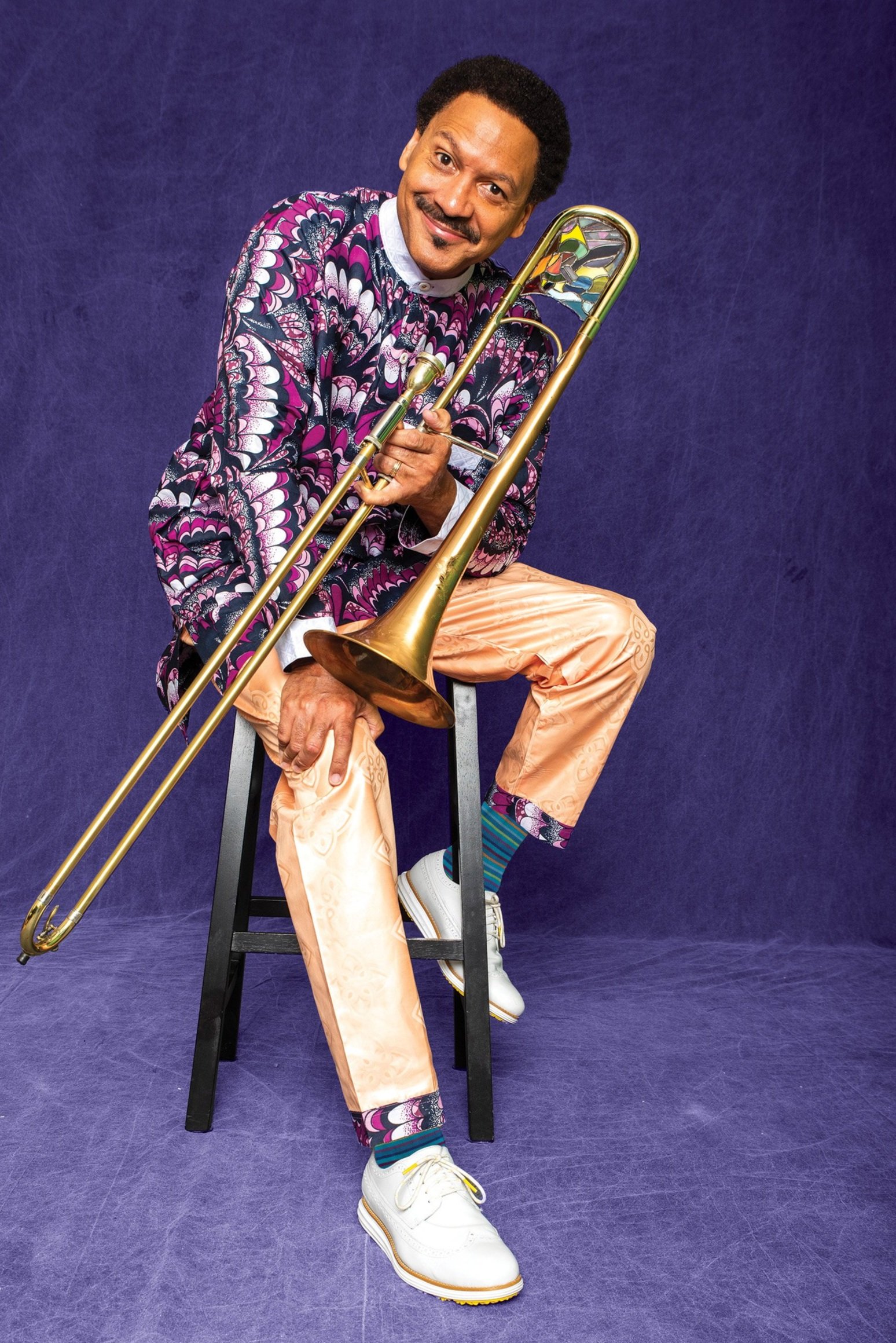Delfeayo Marsalis Premieres Theme Music for ADC
“I wanted something that would make people understand what’s really going on here.”
Delfeayo Marsalis
Jazz Legend Delfeayo Marsalis to Premiere Theme Music Composed for the African Diaspora Consortium at October 5th Conversation and Concert
A New Orleans debut for a composition that speaks to the ongoing experience of African-descended Black people worldwide
When Delfeayo Marsalis sat down to compose theme music for the African Diaspora Consortium (ADC), the first question he asked himself was what people should know about the Consortium – emotionally.
“‘African Diaspora Consortium’ is a mouthful – it sounds kind of academic,” says Marsalis, the NEA Jazz Master Award-winning trombonist, composer, producer and educator, who will premiere his new composition this weekend at ADC’s fourth annual Conversation and Concert series, in New Orleans. “So I wanted something that would make people understand what’s really going on here.”
Delfeayo Marsalis and his Uptown Jazz Orchestra will premiere new theme music for the African Diaspora Consortium at ADC’s Conversation and Concert on Saturday evening, October 5th, at New Orleans’ Ellis Marsalis Center for Music. The event will also feature actress and art collector CCH Pounder. Tickets are available at Eventbrite. Press Contact: Conan N. Louis,
202-494-0324, clouis@adcexchange.org
But how to capture, in five minutes of music, the essence of an organization dedicated to illuminating the 400-year-old global odyssey of Black, African-descended people who were forcibly taken from their homeland?
The solution, it turns out, lay in the answer to a much more pragmatic musical question: “six-eight” or shuffle?
“At first I was leaning toward six-eight because it honors the Motherland – it’s the rhythm of so much African music,” Marsalis, tapping out one-two-three four-five-six, with the emphasis on one and four.
But ultimately, he went with the shuffle – one, a-two, a-three, four, one, a-two, a-three, four – because it speaks to the ongoing experience of Black people in the U.S. and other countries.
“Black people here have had it tough, from the plantations of the 1600s to the police today,” he says. “They’ve had to improvise, think on their feet. And that’s what jazz is all about – solving problems in real time.” In music, ranging from early New Orleans to Duke Ellington compositions like C Jam Blues to the music of today, jazz musicians have to think on their feet, Marsalis says, whether in improvising solos, or responding to what other musicians are doing.
On a more basic level, Marsalis says, “the shuffle makes you want to get up and move – it just feels good,” – a quality that resonates with ADC’s philosophy of teaching “the history of the Diaspora from a standpoint of accomplishment and possibility.
“ADC revises the narrative created by European colonizers to one that embraces the greatness of people of African descent,” he says. People of the Diaspora have profoundly influenced music, language, literature, cuisine and other cultural dimensions in the United States, Brazil, the U.K. and many other nations. But as survivors of slavery, bias and state-sanctioned violence, Marsalis says, Black people have also “provided the moral fiber of this country – the ability to forgive and address injustice with compassion and love instead of violence and hatred.”
The new theme music for ADC, which Marsalis likens to a movement by Beethoven or Mozart, is a conversation among a small orchestra made up of saxophones trombones, trumpets and rhythm. By turns serious and playful, up-tempo and slow, the piece also fulfills another Marsalis dictate: It entertains.
“That’s very New Orleans, and it’s key,” he says. “Because some of these very academic-minded jazz musicians, especially the younger ones, can be like basic researchers in a lab who are simply focused on gathering information instead of looking for a cure. And if music isn’t a cure, then it’s on the wrong track.”
In that spirit, the new composition won’t simply sit on the ADC website or in some virtual archive. “We’re going to put it into the Orchestra’s rotation,” Marsalis says. “We’re going to play it a lot, so it will evolve and change. That’s what jazz is all about.”
Marsalis serves as ADC’s Global Music Artistic Director and has emerged as a central figure in connecting African-descended artists worldwide and educating the public about the historic traditions that are shaping their efforts. In August, the Uptown Jazz Orchestra released “Crescent City Jewels,” an exploration of New Orleans-based funk, R&B, gospel and soul, on the Troubadour label.
Marsalis also co-directs a semester-long online experience offered by ADC that convenes students and emerging artists from six Diaspora countries; leads both the Uptown Jazz Orchestra, which focuses on maintaining important New Orleans traditions, and the Uptown Music Theatre, which empowers youth through musical theatre training; and during the past two years, has publicly fought to protect Congo Square and other “sacred ground” in New Orleans.
The African Diaspora Consortium (ADC) educates the world about the resilience among diaspora populations, their contributions to cultures around the globe, and the connections they share across time and distance. “The Diaspora is a story so central to an understanding of history, cultures, and human experiences that it just has to be examined and told,” says ADC Founder and President Kassie Freeman, an internationally acclaimed scholar on the Diaspora and comparative/international issues in higher education. “Our efforts are guided by the African proverb that ‘until the lion learns to speak, the tales of the hunt will always favor the hunter.”

